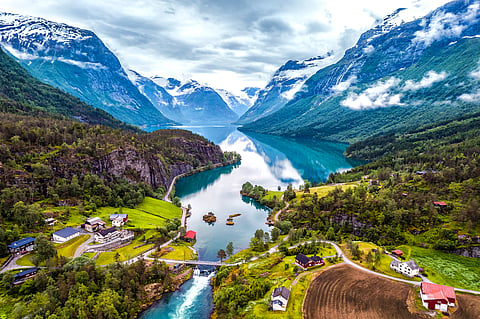

Water crisis of any sort be it about shortage, contamination or conflict, is generally understood to be a nuisance on the continents of Asia, Africa and South America to some extent. However, a recent report has called for the need to address a host of issues endangering the sources of water in Europe.
The report, published by the European Environment Agency (EEA), has noted that less than 40 per cent of surface waters, such as rivers and lakes, are currently healthy.
“The report underscores the urgent need for stricter implementation of the Water Framework Directive (WFD), significant changes to agricultural production, pollution reduction, and urgent ecosystem restoration,” the report titled Europe's state of water 2024: the need for improved water resilience, noted.
The biggest takeaway from the report was the finding that nearly 25 per cent of groundwater bodies do not have a good chemical status, even though they provide almost two-thirds of drinking water in Europe.
It also highlighted that harmful agricultural practices, particularly the intensive use of nutrients and pesticides, continue to be the most significant pressure on water and pollution pressures from agriculture affect 32 per cent of groundwaters and 29 per cent of surface waters.
“The persistently lousy state of Europe’s waters shows that Member States are failing to address the water crisis, year after year. The Water Framework Directive has been in place for over two decades, but its goals remain largely unmet because national governments do not take its requirements seriously,” Claire Baffert, Senior European Union Policy Officer, Water & Climate Change Adaptation at WWF European Policy Office, was quoted in the press statement.
The report also mentioned that the Europeans are increasingly paying the price for their government’s inaction on the water crisis. According to the latest Eurobarometer survey, 78 per cent of Europeans want the EU to do more to address water pollution.
Meanwhile, the report also observed that the deteriorating trend in the chemical status of surface waters and the overall lack of progress are partially linked to the fact that member states are improving their monitoring practices, thereby identifying more pollutants than before.
Andras Krolopp, Head of Biodiversity Policy at The Nature Conservancy Europe, said: “The state of Europe's waters is a wake up call for urgent action. As the EEA report shows, this is not only a European issue, but a global crisis. Restoring at least 25,000 km of rivers to their free-flowing state is not just an environmental necessity: it’s a commitment to biodiversity and our future”.
“Europe has a global commitment under the Convention on Biological Diversity and the Nature Restoration Law to achieve this goal. We need to accelerate the implementation of the Water Framework Directive and prioritise water and ecosystem protection across all policies. The time to act is now, and delay is not an option,” he added.